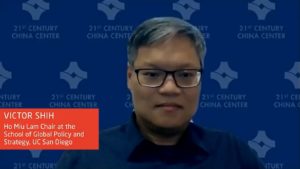
Strategic analyst Victor Shih, author of Coalitions of the Weak, (2022), looks at China’s sudden exit from its contested zero-Covid policy. Was it because of the protests, was it planned before, and what does it mean for the country’s domestic policies and economics? A discussion at the New Yorker on how decisions at the top-level take place.
The New Yorker:
Were these policy changes announced because of the protests, or for economic reasons?
We don’t have a lot of detail. But, as far as some of us can piece together, there has been a debate among top-level leaders. And we definitely can see the debate among experts who advise the Chinese government on the degree of opening. For a long time, there has been a side which strongly advocated for the continuation of a “zero covid” policy. But in recent months, even before the protests began, there were experts in the Chinese government who increasingly spoke out in favor of a more relaxed approach, emphasizing vaccination instead of draconian levels of quarantine. And I think the protests perhaps tipped things a little bit more in favor of the opening camp, or at least some degree of opening. It is unclear at this point how much opening there will be.
It really speaks to the challenge of authoritarian government, especially a kind of dictatorship that controls all forms of media, and has explicitly ordered the media to obey everything the government wants to convey. Sometimes even the Politburo itself does not get a lot of information about the level of satisfaction or dissatisfaction in the population. It took something like a multi-city protest to really make Xi Jinping realize that perhaps there is a groundswell of demand for a more relaxed approach.
Your answer implies a certain amount of debate on this, that it’s not just Xi making these decisions on his own. Is that how you see it?
At the highest level, among Politburo Standing Committee members, we don’t know whether there has been a debate. I suspect that there has been—not an open debate, but someone must have pushed some of this expert opinion to the Politburo level for the opening that we’re seeing to happen so quickly. Briefing material about why opening is potentially justifiable, and potentially not so disastrous for China, must have been there already or it wouldn’t have happened so fast after these protests.
I think that someone like Sun Chunlan, who is in charge of health policies in China, must have read a lot of this briefing material. Whether she was in favor of more opening to begin with is unclear. In fact, I think that may not be the case. It might have been someone else who has been advocating for more opening. The rumor is that Wang Huning, who’s a Politburo [Standing] Committee member, and has been an adviser to Xi Jinping since he took office, was or has been the person pushing for a more relaxed approach to covid. But these are just rumors…
Were you surprised by how quickly, at least publicly, China backed away from its covid policies? People I’ve talked to who know more than me seemed a little bit surprised.
I was surprised. There was this rumor that Wang Huning was advocating it for quite some time, but I never really believed in that rumor. I don’t really know if that’s the case. But it would take an advocate at that level to make it happen. There are two surprising aspects of this. One is that, in some places at least, we are seeing lockdown policies being liberalized very rapidly. And even in Beijing. My previous assessment had been “Oh, there could be relaxation in other parts of China, but certainly not Beijing, where the leadership lives.”
Victor Shih is a speaker at the China Speakers Bureau. Do you need him at your meeting or conference? Do get in touch or fill in our speakers’ request form.
Are you looking for more strategic experts at the China Speakers Bureau? Do check out this list.
No comments:
Post a Comment